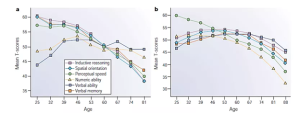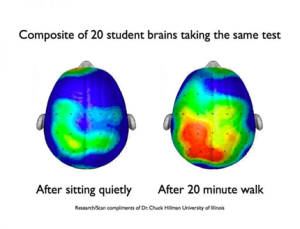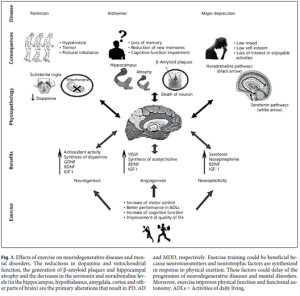Fitness for the Mind: How Exercise Boosts Cognitive Functioning
The positive adaptations in various systems of the body from exercise is relatively well-established & familiar to most. For example, we know how effective exercise is at improving bone density, cardiovascular health and in treating metabolic conditions such as type 2 diabetes. However, what has not received as much attention in the literature is the impact of exercise on cognitive function.
Like most physiological capacities, cognitive capacities will decline with age as per the graphic below.

Exercise has been shown to improve circulatory system health and recent research is starting to show a positive relationship between circulatory system health and improvements in regions of the brain responsible for memory, planning and processing speed. In fact, by providing a good flow of oxygen-rich blood to the brain, which can be increased by exercise, we can promote the growth of neurons (neurogenesis) and improve connectivity between different regions of the brain – at any age.
Click below to watch Sandrine Thuret’s talk:
Further evidence is offered by Prince et al. 2014 and Whitmer et al. 2005, who espouse that the following factors during midlife and early adulthood can maintain cognitive function, and decrease the risk of cognitive decline:
- regular physical activity
- genetic factors (no family history of cognitive disease)
- decreased stress and absence of depressive symptoms
- having more than eight years of formal education
- social support and engagement
- diet: especially a Mediterranean diet
- cognitive engagement in mentally stimulating activities.
When I was teaching undergraduate human services students, I would often show the MRI graphic below from Dr Chuck Hillman (University of Illinois). Pay particular attention to the increase in neural activity in the brain to the right with significantly more ‘colour.’ The dose of exercise that resulted in this positive change was simply a walk for 20 minutes!

In addition to preserving cognitive capacity, evidence is also emerging to support the application of exercise as a treatment for neurodegenerative diseases and mental disorders. As per the graphic below, we now know that the positive adaptation of exercise include:
- Neurogenesis (the process by which new neurons are formed in the brain)
- Angiogenesis (the formation of new blood vessels in the brain)
- Neuroplasticity (the ability of the neural network in the brain to change its structure and function through growth and reorganization).
You will see that the common driver for each of these adaptations is BDNF (brain-derived neurotropic factor), which is a protein that helps regulate synaptic plasticity, which is important for learning and memory.

Whilst we still have much to learn about the relationship between exercise and cognition, the emerging evidence tends to suggest that the application of exercise as medicine in this field is very positive.
Author:
Brad McGregor (MSptSc, Grad Cert Ex Med)




